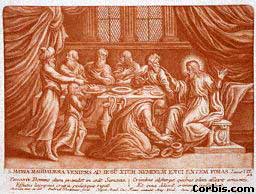... this is the same Mary who sat at Jesus' feet while Martha did housework. She seems to be quite the devotee.
Then Judas Iscariot -- one of his disciples, the man who was to betray him-said, 'Why was this ointment not sold for three hundred denarii and the money given to the poor?' He said this, not because he cared about the poor, but because he was a thief; he was in charge of the common fund and used to help himself to the contents.
... John looks back after the crucifixion and reads into Judas' words the motivation he assumes must have been in a traitor's heart? Perhaps Judas was jelouse of the close relationship between Jesus and Mary.
So Jesus said, 'Leave her alone; let her keep it for the day of my burial. You have the poor with you always, you will not always have me.'
... I've heard this line used by some to justify not working against poverty ... what's the point, it will always be with us. I disagree, as Jesus often told people to give to the poor. Maybe Jesus, forseeing his death, can be allowed a moment to sadly treasure the devotion of Mary in the face of his mortality ... he was human as well as divine.
BTW - the online version of the New American bible says about the annointing of J's feet and his response ... Jesus' response reflects the rabbinical discussion of what was the greatest act of mercy, almsgiving or burying the dead. Those who favored proper burial of the dead thought it an essential condition for sharing in the resurrection.

4 comments:
You wrote: "Perhaps Judas was jelouse of the close relationship between Jesus and Mary." Here's another one:
Perhaps Judas was tired of all the pussyfooting around and wanted to force Jesus to use his power to "bring in the kingdom".
We can only speculate about Judas: what he meant to the ones who wrote the gospels. There are lots of possibilities.
Hi Larry. Yes, I guess we'll never know. Judas has been given all different motivsations by different novelists. I saw this interesting tidbit ...
In Nikos Kazantzakis's 1955 novel THE LAST TEMPTATION OF CHRIST, Judas essentially betrays Jesus on Jesus' own orders, which garnered the author excommunication from the Greek Orthodox Church.
Funny about Kazantzakis. The gospels seem to support his thesis -- do what you must do -- or soemthing like that.
There used to be a hsitory series on Canuck TV -- called Witness to Yesterday. This guy would interview historical figures. One episode was Judas Iscariot. They presented everythinga s a kind of publicity stunt gone bad -- Jesus and Judas prearranged the arrest so so the people would be outraged and riot and revolution would follow -- but instead the people caleld for his execution.
I dunno. It makes a kind of sense.
I have to say that I've always thought dismissing Judas as pure evil was too easy. Judas is like us, he wants things done his way -- perhaps he betrayed Jesus to force his hand and make him step up and become a political leader. And I think this is the greatest danger all of us face -- preferring our will to God's -- perhaps our daily decisions don't have this obvious magnitude to them, but I think Judas is there to remind us what happens to us when we ignore God's will and do our own. [but the problem comes when we think we are doing God's will....what if Judas really thought he was doing God's will...or like kwake references, what if Judas was only following Jesus' orders? Kinda like Pharoah in Exodus...]
However, Judas was no average Joe, this passage points out that he was skimming from the disciples' purse...perhaps as further warning that its the 'little' sins that make way for Satan's infiltration -- which is what the Bible says occurs to Judas.
Post a Comment